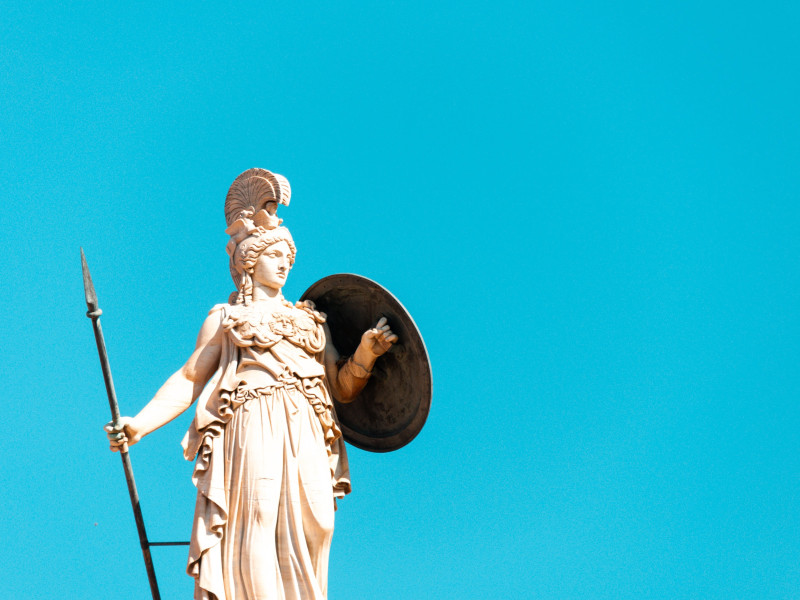





Written By Nik Koulogeorge

Written By
Published
Oct. 3, 2018
Updated
Nov. 21, 2021
Towns, cities, and city-states would often adopt patron gods. To these gods, they would offer tribute or worship in exchange for protection or well-being. Upon its establishment, the people of Athens had trouble determining which of the gods would best lead them to a prosperous future. Although it was, according to the story, not yet named Athens, the city-state is known as the birthplace of true democracy. It developed the most powerful navy among the Greek city-states (and in the known world, at the time). Athens was prosperous and a regional leader of vital importance to the Greek people. Today, it is the country's capital city and home to the famed Acropolis.
The most powerful and well-known of the Greek Gods are the Olympians. Olympians include Zeus, Hades, Hera, Apollo, Aphrodite, and Ares among others. The battle for Athens occurred between two of these Olympian gods: Athena and Poseidon. Their relationship with Athens is obvious when you know what each god stands for. Athena is the goddess of wisdom, strategic warfare, and handicraft. She is the daughter of Zeus, a virgin goddess, and one of the most powerful Olympians. She connects to Athen's historic role as a democratic society. Poseidon, Zeus' brother, is the god of the seas, of earthquakes, and of horses. Sailors would pray to Poseidon prior to any journey. As a naval power, he too has an obvious connection to Athens (though the name of the city spoils this story, doesn't it?).
Both Athena and Poseidon were well-revered and powerful gods. They each served as patrons for other city-states and villages. So to overcome his peoples' indecisiveness, the King of Athens, Cecrops, asked that the gods participate in a contest to see who could provide a gift of true value to the city-state.
Poseidon went first and he struck his mighty trident into the ground, which erupted with steam. From the split in the earth came a spring, but the water turned out to be salty and of no use to the Athenians. For her turn, Athena too struck the ground with her spear. She planted an olive branch into the earth which grew into an olive tree. The olive tree represents peace, but also prosperity. It produced food, oil, and wood for the people of the town.
Impressed by Athena’s gift, Cecrops selected her as the patron god of Athens. The decision enraged Poseidon, who cursed the city so that it would never have an adequate supply of freshwater. (Despite being situated in a wonderful place to establish a navy, Athens has historically suffered from a shortage of local freshwater). This may only be a story, but it teaches a valuable lesson.
As a leader, always remember that it is up to you to earn the trust and support of your followers. Without them, you are merely another person acting alone and inefficiently. Leadership cannot be demanded, it cannot spring from threats, policies, or arbitrary authority (Poseidon was after all Athena’s uncle and one of the most powerful gods); it must be earned.
The greatest way to establish trust among one’s followers is to create an opportunity to develop a relationship that is mutually beneficial. Poseidon’s spring would have addressed the water-shortage of Athens, but Poseidon was consumed with an egotistical desire to demonstrate his strength. What he produced was representative only of himself and not his affection for or commitment to the Athenian people.
The olive tree, on the other hand, was both symbolically and practically useful to the people of Athens. Athena is the goddess of wisdom, warfare, and skilled craft, and yet she produced something which represents peace and prosperity. (Ares represents the more brutish elements of warfare compared to the strategy and wisdom demonstrated by Athena). Much like our fraternities and sororities adopt symbols and values, the people of Athens adopted the values of Athena to apply to their collective future.
With this choice, Athens became a major power and prosperous city-state. It was essential in establishing a league of city-states capable of fending off threats from militaristic Sparta and the overbearing Persian empire. People will always choose to follow those who offer respect and a good deal. That’s something every leader or potential leader should keep in mind.
You may have been voted President of your chapter, alumni group, or national organization, but your position is not the basis for your authority or respect. Unless you came into your position through secretive, underhanded, or coercive means, you were likely put into that position because you were deemed the person with the most to offer. Do not let your position get the best of you. Focus less on exerting power and authority and more on what your authority can do to help those around you. Lead by demonstrating what good can come of your ideas and you will be followed faithfully.
(I should note that the people of Athens still respected and offered tribute to Poseidon, even if he was not the one after which the town was named. As mentioned, sailors would pray to Poseidon before a journey. Individual people may have offered tribute to any number of gods or goddesses depending on their trade and needs at any given time. But it was Athena to which they entrusted their collective future and whose values they sought to espouse as a community.)
Help keep it going and growing by contributing as little as $2. (Links below will take you to a secure payment portal via Stripe)
A free way to support: Subscribe to the Fraternity Man newsletter for [very occasional] updates and giveaways.